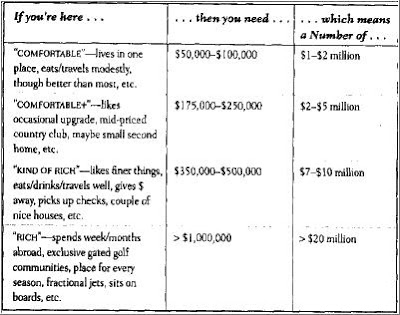 Not too long ago, I read Lee Eisenberg’s book called “The Number,” which tries to answer the life-defining question: “How much money do you need to secure the rest of your life?”
Not too long ago, I read Lee Eisenberg’s book called “The Number,” which tries to answer the life-defining question: “How much money do you need to secure the rest of your life?”
Obviously, I am a very interested party in that subject since that topic seems to come up quite frequently when talking to readers and clients. While he has some interesting analogies, I had to read through over 230 pages before finally encountering something that resembled a number.
It was somewhat agonizing to be left in the dark for 17 chapters of what “the number” might be. Finally, after what seemed like an eternity, on page 234, the author displays the following table:
While the topic itself is extremely important, it wasn’t presented in depth enough to give me, the anxious reader, more details and actual case histories of how various “Numbers” have worked and under what circumstances they didn’t.


Comments 4
Wow Ulli! Those numbers seem quite high. Are those numbers considered an “average” for someone living in the USA or is he being conservative? I’m in my mid-thirties, I know that both sets of my grandparents retired on considerably less, and my parents (now approaching retirement) are no where near those numbers; I guess that leaves me to the question how many people actually save that much and what rate of return would you need to consistently deliver at?
Lets take me as an example if I have a 401k currently worth 50k, max out my 401k (15k a year), factor in my employer match 30%, and I retire in 30-years getting between 8% to 12% a year that puts me somewhere around 3M to 7.8M (not to mention that is 3-8M in today’s dollars). I’m not sure that I agree with the applicability of the book. Although he is right my wife and I could certain retire on those numbers!
That was my point. I know a lot of people who live on less than described in this book. Most retired investors could happily live on these numbers.
This is the part I found disappointing and not very well covered. It makes the book “thumbs down” in my view.
Ulli…
I agree, I for one would happily live on those numbers! What I am wondering is: 1) are those numbers for a individual or would it be a combined joint number for me and my spouse, and 2) do those amounts include or exclude social security income?
I don’t know—you may want to read the book…
Ulli…